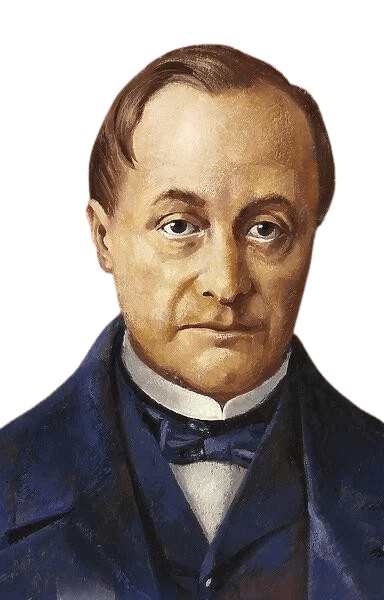Life and achievements
Early life
Auguste Comte was an influential French philosopher known as the founder of sociology and positivism. He was born on January 20 20, 1798, in Montpellier, France. He was a bright student in his early years and was admitted to the École Polytechnique in Paris at 16. However, political changes in France led to the closure of the École Polytechnique in 1816, and Comte's education was cut short.
In 1817, Comte met the social theorist Henri de Saint-Simon, whose ideas shaped his thinking in many ways. Comte joined Saint-Simon and worked for him as his secretary and co-author of numerous articles concerning social and political matters. This time was significant for Comte because he started to develop his vision of the world and the place of society and science in it.
The two had a somewhat ambivalent interaction; Comte was a follower of Saint-Simon and simultaneously had a bitter rivalry. By 1824, Comte had become disenchanted with how Saint-Simon was doing things and moved out to follow his line of thought. At this time, he married Caroline Massin, who helped him through his periods of insanity.
In 1826, he started giving his "Course of Positive Philosophy," but a mental breakdown stopped him. Despite being admitted to the hospital and still not being cured, he regained his health with his wife's help and returned to his lectures in 1829. This was the start of what could be termed the most productive phase of Comte's life, culminating in the production of his magnum opus, the "Course of Positive Philosophy" (1830-1842).
Legacy
Auguste Comte's vast and diverse influence goes far beyond sociology and positivism. Comte was the first sociologist to lay the foundation for the scientific study of society by stressing the scientific approach to studying social phenomena. His positivism, the belief in the importance of observation and experience against speculation, was felt in philosophy, science, and politics.
Comte's idea of the "Religion of Humanity" was a structure of secular morality intended to replace religious institutions and directed at the worship of humanity to promote unity and ethical behaviour. While this part of his work was also somewhat contentious and unsuccessful, it demonstrated his desire to include moral and affective elements into social theory.
Comte spread his ideas internationally, especially to Latin America, where he influenced educational and political changes. Brazil's national motto is "Order and Progress," a direct adaptation of Comte's Positivism. His influence on scholars such as Émile Durkheim and John Stuart Mill helped cement his status in the history of social thought.
Although Comte was criticized for his later works, which were considered authoritarian and dogmatic, he played a significant role in the development of sociology and the promotion of the scientific study of social questions. His work is still being analyzed and discussed today, showing that his concepts are relevant.
Join Confinity today to protect your digital privacy and take control of your online presence. Signup Now
Learn how historical figures leave behind lasting legacies that shape culture →
Milestone moments
Jan 9, 1814
Admission to École Polytechnique
Auguste Comte entered the École Polytechnique in Paris at the age of 16.
It was one of the most demanding schools that offered education in mathematics and science.
This was the start of his formal education, and he proved to be a brilliant student.
Aug 7, 1817
Saint-Simon and the idea of collaboration
Comte got to know Henri de Saint-Simon and became the latter's secretary, thus beginning a fruitful collaboration.
Through this association, Comte was acquainted with political and social theory, which significantly impacted the initial stage of his work and his vision of societal transformation.
Apr 7, 1826
At the beginning of the "Course of Positive Philosophy,"
Comte started lecturing on the "Course of Positive Philosophy" to give society a new scientific way of thinking.
Although interrupted by a mental illness, this series of lectures later evolved into his magnum opus and made him one of the most influential thinkers of his time.
Oct 15, 1842
Publication of the "Course of Positive Philosophy"
Over twelve years, Comte produced the six "Course of Positive Philosophy" volumes.
He created the foundation for his positivist worldview and sociology as an individual science.
This work has remained relevant even to this day and is considered one of the most essential texts in sociological theory and positivism.
